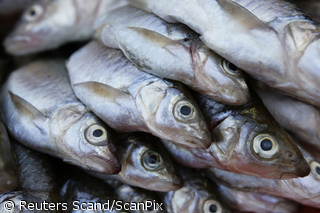Protests against fuel prices blocked highways across Europe Tuesday.
Published:
13 September 2000 y., Wednesday
Protests against fuel prices blocked highways across Europe Tuesday and as pumps ran dry in Britain Prime Minister Tony Blair vowed tough action to move supplies through blockades.
Hauliers furious at high prices and taxes promised more wildcat action across the continent. Protests began in Germany and more were likely in Spain and Ireland.
Although crude oil prices dropped more than $1.30 a barrel, oil traders warned that market fundamentals pointed to continuing high prices in spite of an OPEC pledge to increase production.
Panic buying swept Britain, draining the few remaining supplies of fuel. In the worst hit areas, rubbish went uncollected and hospitals canceled non-emergency services.
"Whatever the strength of feeling there can be no excuse whatever for this type of action which is hurting our people, businesses and emergency services severely," Blair told a news conference after cutting short a visit to northern England.
"Legitimate protest is one thing, trying to bring the country to a halt is quite another," he said, adding that he hoped the situation would be on the way back to normal within 24 hours.
The Organization of the Petroleum Exporting Countries decided Sunday to raise output by 800,000 barrels per day.
European Union foreign ministers said Tuesday that OPEC's latest output increase should help stabilize world oil prices. The bloc's transport ministers said they would meet next week to discuss the impact of high prices.
Šaltinis:
lycos.com
Copying, publishing, announcing any information from the News.lt portal without written permission of News.lt editorial office is prohibited.
The most popular articles
 New legislation for pan-European supervision of credit rating agencies and a public debate on how financial institutions are managed.
more »
New legislation for pan-European supervision of credit rating agencies and a public debate on how financial institutions are managed.
more »
 On 2 June in Vilnius, Lithuania‘s Vice-Minister of Foreign Affairs Asta Skaisgirytė Liauškienė and Deputy Director General of the World Trade Organization Rufus H. Yerxa discussed the main issues on the international trade policy agenda, Russia‘s WTO accession and the changing role of China in the world economy.
more »
On 2 June in Vilnius, Lithuania‘s Vice-Minister of Foreign Affairs Asta Skaisgirytė Liauškienė and Deputy Director General of the World Trade Organization Rufus H. Yerxa discussed the main issues on the international trade policy agenda, Russia‘s WTO accession and the changing role of China in the world economy.
more »
 2157 former construction workers in Spain and 598 ex-employees at the Irish crystal glass company Waterford Crystal with suppliers could get €11 million in EU globalisation adjustment fund aid for training, self-employment and professional orientation under plans approved by the Budgets Committee on Wednesday.
more »
2157 former construction workers in Spain and 598 ex-employees at the Irish crystal glass company Waterford Crystal with suppliers could get €11 million in EU globalisation adjustment fund aid for training, self-employment and professional orientation under plans approved by the Budgets Committee on Wednesday.
more »
 Companies from the UK, Belgium, Germany and Spain have won the 2010 European Business Awards for the Environment.
more »
Companies from the UK, Belgium, Germany and Spain have won the 2010 European Business Awards for the Environment.
more »
 The planned overhaul of EU fisheries policy should devolve more powers to regions, protect small coastal fleets and boost aquaculture, said MEPs and members of national parliaments on Tuesday.
more »
The planned overhaul of EU fisheries policy should devolve more powers to regions, protect small coastal fleets and boost aquaculture, said MEPs and members of national parliaments on Tuesday.
more »
 The first in a series of loan agreements for energy efficiency investments in multi-apartment buildings was signed today between the European Investment Bank (EIB), as manager of the JESSICA holding fund in Lithuania, and Šiaulių bankas.
more »
The first in a series of loan agreements for energy efficiency investments in multi-apartment buildings was signed today between the European Investment Bank (EIB), as manager of the JESSICA holding fund in Lithuania, and Šiaulių bankas.
more »
 Despite the current economic crisis and tensions in the euro, Estonia is set to adopt the single currency in January.
more »
Despite the current economic crisis and tensions in the euro, Estonia is set to adopt the single currency in January.
more »
 Commission proposes a bank tax to cover the costs of winding down banks that go bust.
more »
Commission proposes a bank tax to cover the costs of winding down banks that go bust.
more »
 The European Investment Bank will provide a total of EUR 400 million to Hellenic Petroleum SA in order to increase the production of cleaner fuels via the upgrading of the Elefsina refinery.
more »
The European Investment Bank will provide a total of EUR 400 million to Hellenic Petroleum SA in order to increase the production of cleaner fuels via the upgrading of the Elefsina refinery.
more »
 European ministers meet on Tuesday and Wednesday in Brussels at the final Competitiveness Council to be held during the six months of the Spanish Presidency, which has an agenda laden with important issues such as the electric vehicle, the European patent system and national R+D investment goals.
more »
European ministers meet on Tuesday and Wednesday in Brussels at the final Competitiveness Council to be held during the six months of the Spanish Presidency, which has an agenda laden with important issues such as the electric vehicle, the European patent system and national R+D investment goals.
more »